A Hybrid Approach to WCTT Analysis in a Real-Time Switched Ethernet Network
Résumé
Real-time Ethernet has become a popular solution for handling critical communication in embedded systems, partly thanks to the availability of safe worst-case traversal time analysis. These analyses scale well, but provide pessimistic upper bounds on end-to-end delays leading to over-dimensioning of the network architecture. Computing worst-case delays requires an exhaustive search over all possible scenarios that quickly leads to a combinatorial explosion. Consequently, it is limited to network configuration with less than 100 flows, far from industrial-size ones with more than 1000 flows. In this paper, we propose a hybrid approach (HA) that (1) reduces the number of scenarios to be analysed to get the worst-case delay, (2) leverages exact delays in order to tighten bounds on worst-case delays when the reduced number of scenarios is still too big to be completely analysed. On a realistic avionics case study, HA proved scalable for worst-case delay computations and reduced upper-bound pessimism by over 40%.
| Origine | Fichiers produits par l'(les) auteur(s) |
|---|
